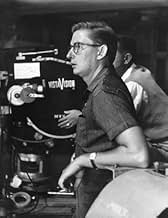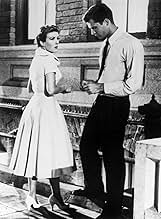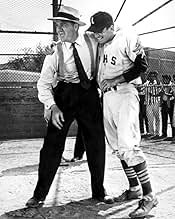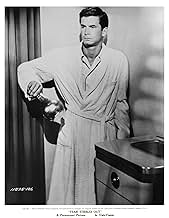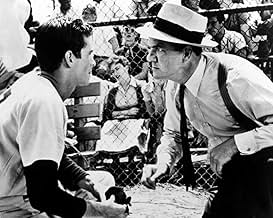AVALIAÇÃO DA IMDb
6,9/10
2,2 mil
SUA AVALIAÇÃO
Adicionar um enredo no seu idiomaTrue story of the life of Jimmy Piersall, who battled mental illness to achieve stardom in major league baseball.True story of the life of Jimmy Piersall, who battled mental illness to achieve stardom in major league baseball.True story of the life of Jimmy Piersall, who battled mental illness to achieve stardom in major league baseball.
- Direção
- Roteiristas
- Artistas
- Prêmios
- 1 indicação no total
John Aberle
- Ballplayer
- (não creditado)
Eric Alden
- Policeman
- (não creditado)
Heather Ames
- Nurse
- (não creditado)
Sam Balter
- Broadcaster
- (narração)
- (não creditado)
Mary Benoit
- Nurse
- (não creditado)
John Benson
- Reporter
- (não creditado)
Don Brodie
- Reporter Evans
- (não creditado)
Richard Bull
- Reporter Slade
- (não creditado)
Bart Burns
- Joe Cronin
- (não creditado)
Edd Byrnes
- Boy in Car Assisting Jimmy Up Stairway
- (não creditado)
Wade Cagle
- Intern
- (não creditado)
Keith Coyne
- Baby
- (não creditado)
Avaliações em destaque
This a very interesting, but not totally factual, account of the life of Jimmy Piersall. Piersall was a popular player with the Boston Red Sox. His antics on and off the field are now legendary. Piersall fell in love with baseball at a young age, but his domineering father forced Jimmy to not only achieve, but to play to perfection. Mr. Piersall's constant manipulating can be traced to his son's mental breakdown.
Anthony Perkins puts in a dedicated performance as Jimmy Piersall. Karl Malden excelled as the relentless Mr. Piersall. Also in the cast are Bart Burns, Norma Moore and Adam Williams.
This is a very stark and interesting movie, just don't take all the content as gospel. A baseball fan's delight.
Anthony Perkins puts in a dedicated performance as Jimmy Piersall. Karl Malden excelled as the relentless Mr. Piersall. Also in the cast are Bart Burns, Norma Moore and Adam Williams.
This is a very stark and interesting movie, just don't take all the content as gospel. A baseball fan's delight.
FEAR STRIKES OUT has to be the classic compulsive "sports Dad" movie. I think every father with a son in sports should be required to see this film--especially after what we've seen recently with regard to parents in fist fights at their sons' Little League games. If ever there was an overbearing, driving patriarchal figure trying to live out his past inadequacies through his son in sports, Jimmy Piersall's father was he. In fact, I watch this movie not so much for the Jimmy Piersall story so much as to see Karl Malden's portrayal of John Piersall! Of course, we don't know how much is embellished, but if Mr. Piersall was even half of what is depicted in this movie, it is little wonder that Jimmy Piersall once hit a home run and ran around the bases backwards...
Could anyone play a more iron-fisted character than Karl Malden? Watch PARRISH (1963) or BOMBERS B-52 sometime to see the equal of Piersall's Dad in FEAR STRIKES OUT. And Piersall's mother? Again, no one knows how accurate the depiction is, but she is a ghost presence and if that is true, it's just another nail in Piersall's psychological coffin.
Even watching this movie as a kid, I was uncomfortable seeing Piersall pounded cruelly again and again by his Dad to do better, to go higher, to do more. Once he's romanced by The Boston Red Sox, Mr. Piersall becomes Jimmy's indispensable "advisor." All of this grows until Jimmy can do nothing without consulting Dad. The result is his father's eternal presence between his ears and the classic breakdown scene at the park when Piersall climbs the fence, an unforgettable moment, especially if you see this as an adolescent.
Reviews concerning Anthony Perkins'lack of athletic ability always come up when this movie is discussed. Actually, this was characteristic of most sports movie bio's back in the 1940's and 1950's. Watch William Bendix as Babe Ruth, Ronald Reagan as Grover Cleveland Alexander, or Dan Daily as Dizzy Dean. Routine throwing and catching resembles something you used to see a "nerd" do at school recess. And this movie quirk wasn't present in baseball films only.
I've always wondered just who this movie is about: Jimmy Piersall or his father? The scene in which the psychiatrist confronts Mr. Piersall at the sanitarium is painful and very sad. I've also always wondered just what Piersall's thoughts must have been when this movie hit the screens: for his was still active in the major leagues. How many teams did Jimmy Piersall play for? How many fist fights? And his announcing career? Full of controversy. Maybe it would have all happened without John Piersall, but it is doubtful. Next time a boy wishes his father was more into sports, remind him of John Piersall.
Exhibit 'A' for all fathers living vicariously through the sports achievements of their sons.
Dennis Caracciolo
Could anyone play a more iron-fisted character than Karl Malden? Watch PARRISH (1963) or BOMBERS B-52 sometime to see the equal of Piersall's Dad in FEAR STRIKES OUT. And Piersall's mother? Again, no one knows how accurate the depiction is, but she is a ghost presence and if that is true, it's just another nail in Piersall's psychological coffin.
Even watching this movie as a kid, I was uncomfortable seeing Piersall pounded cruelly again and again by his Dad to do better, to go higher, to do more. Once he's romanced by The Boston Red Sox, Mr. Piersall becomes Jimmy's indispensable "advisor." All of this grows until Jimmy can do nothing without consulting Dad. The result is his father's eternal presence between his ears and the classic breakdown scene at the park when Piersall climbs the fence, an unforgettable moment, especially if you see this as an adolescent.
Reviews concerning Anthony Perkins'lack of athletic ability always come up when this movie is discussed. Actually, this was characteristic of most sports movie bio's back in the 1940's and 1950's. Watch William Bendix as Babe Ruth, Ronald Reagan as Grover Cleveland Alexander, or Dan Daily as Dizzy Dean. Routine throwing and catching resembles something you used to see a "nerd" do at school recess. And this movie quirk wasn't present in baseball films only.
I've always wondered just who this movie is about: Jimmy Piersall or his father? The scene in which the psychiatrist confronts Mr. Piersall at the sanitarium is painful and very sad. I've also always wondered just what Piersall's thoughts must have been when this movie hit the screens: for his was still active in the major leagues. How many teams did Jimmy Piersall play for? How many fist fights? And his announcing career? Full of controversy. Maybe it would have all happened without John Piersall, but it is doubtful. Next time a boy wishes his father was more into sports, remind him of John Piersall.
Exhibit 'A' for all fathers living vicariously through the sports achievements of their sons.
Dennis Caracciolo
This is not what one would call a pleasant film to watch particularly about Baseball. It tells the true story of former major league ball player Jim Piersall of the Boston Red Sox and his eventual mental breakdown. While certain events are not exactly the way they took place the story nonetheless sticks pretty much to fact. Anthony Perkins puts in a dynamic performance as Piersall. A kid who likes baseball but is driven to madness by his domineering perfection minded father played by Karl Malden. Also included in the cast is Norma Moore as Jims devoted wife Mary and Adam Williams as the psychiatrist Doctor Brown.
The first half of the picture deals with Piersall growing up practicing and playing baseball always under the scrutiny of his father. Whatever Jim did on the playing field it could always have been done better according to his Dad. The second half of the film deals with Piersalls mental breakdown and subsequent treatment and recovery. While watching a ball game on TV he makes remarks that his doctor picks up on and uses to unlock the reason why he cracked up. These same circumstances are no doubt still occurring today as many parents push their children relentlessly in everything from sports to academics to beauty pageants. Jim Piersalls story fortunately became a book and later this fine film that perhaps has and will continue to serve as a message to those who watch it. Whether you're a baseball fan or not this is a movie to be seen.
The first half of the picture deals with Piersall growing up practicing and playing baseball always under the scrutiny of his father. Whatever Jim did on the playing field it could always have been done better according to his Dad. The second half of the film deals with Piersalls mental breakdown and subsequent treatment and recovery. While watching a ball game on TV he makes remarks that his doctor picks up on and uses to unlock the reason why he cracked up. These same circumstances are no doubt still occurring today as many parents push their children relentlessly in everything from sports to academics to beauty pageants. Jim Piersalls story fortunately became a book and later this fine film that perhaps has and will continue to serve as a message to those who watch it. Whether you're a baseball fan or not this is a movie to be seen.
I don't find movies about illnesses whether they are physical or mental, real or fictitious, to be entertaining, maybe informative or educational, so I am approaching my criticism of this movie from the baseball aspect. Jimmy Piersall was quite a character. He overcame a mental breakdown to become one of the greatest outfielders in baseball history. He was a real crowd pleaser with his fielding and antics, but his hitting left a lot to be desired. He just about ruined his arm showing off how far and hard he could throw the ball. When he hit his 100th homerun, he ran the bases backwards. Living near Boston, I saw him play ball on many occasions and I met him in person at a First National Supermarket opening in Lawrence, Mass. He signed a baseball and a photograph of himself for me, but I had to buy two bags of potato chips (Cains, I think it was) beforehand. As a kid, I could barely afford it, but more than fifty years later, I still have the ball and photo. What a thrill it was! I remember him as being handsome and big and strong, not a skinny guy like Anthony Perkins. As far as the movie goes, it was good, but not very accurate. Did you notice the obvious padding to Perkin's shoulders to make him look bulky? He looked like he never played baseball in real life, he was so awkward. (Gary Cooper as Lou Gehrig and William Bendix as Babe Ruth also looked pretty bad in their baseball movies). Did you notice that the stock footage was of Fenway Park but whenever Perkins was playing they showed some minor league park? Just look at the outfield background, that's not Fenway. What really bothers me is that they only mention one real life Red Sox person, Joe Cronin, and that was wrong, it should have been Pinky Higgins. What happened to Ted Williams, Jackie Jensen (my all time favorite Red Sox player), Dom Dimaggio, Bobby Doerr, Johnny Pesky, and a bunch of others who played on the team with Piersall? Ted's career was actually extended because Piersall was so good as a fielder that he used to run from center to left to catch flyballs so that Williams didn't have to tire himself out trying to get to them. Piersall was eventually traded to another team, so all his euphoria about playing for the Bosox didn't last. Still with all its' faults and disappointments, this movie is well worth watching, especially for baseball fans.
FEAR STRIKES OUT dealt with a theme not often portrayed in films of the '50s--mental illness--and is a shattering example of how a father's insistence on perfection can have a significant effect on the well being of a sensitive individual unable to meet his father"s expectations. Marketed at time of release as a baseball movie, it's really a relationship movie about a father and son--that is the real heart and soul of the story.
Based on the real life story of Jim Piersall, a well known American sports figure for the Boston Red Sox, as taken from his own account of his life. Slowly the picture emerges of the kind of stress he was under to achieve his goal of playing in the majors, the kind of guilt he felt whenever he did something that aggravated his father--as in simple disobedience when he didn't come straight home after work and then broke his ankle at an ice skating rink.
Even in the midst of achievements, his father finds flaws to criticize. "Wish me luck," he pleads with his father when the Red Sox signs him. "No, luck won't do it. You've got to be thinking and planning all the time."
And later on in the film, after his breakdown and he lands in a mental asylum, he defends his father to his psychiatrist with, "If it hadn't been for him pushing me and driving me, I wouldn't be where I am today!" Chilling words and the scene is the turning point in Piersall's progress toward recovery and the root cause of his problems.
It's the sort of film everyone can relate to, sports minded or not, because it does reveal the danger of parents who expect too much from their children, with tragic results. The scene where Malden tries to take him from the hospital before he's ready to go, is a chiller.
Both ANTHONY PERKINS and KARL MALDEN give the kind of performances that merited at least Oscar nominations--solid and superb.
Summing up: A satisfying, mature drama that takes a penetrating look at the danger of pressure-driven father/son relationships in the sports world where winning is the only thing that counts.
Based on the real life story of Jim Piersall, a well known American sports figure for the Boston Red Sox, as taken from his own account of his life. Slowly the picture emerges of the kind of stress he was under to achieve his goal of playing in the majors, the kind of guilt he felt whenever he did something that aggravated his father--as in simple disobedience when he didn't come straight home after work and then broke his ankle at an ice skating rink.
Even in the midst of achievements, his father finds flaws to criticize. "Wish me luck," he pleads with his father when the Red Sox signs him. "No, luck won't do it. You've got to be thinking and planning all the time."
And later on in the film, after his breakdown and he lands in a mental asylum, he defends his father to his psychiatrist with, "If it hadn't been for him pushing me and driving me, I wouldn't be where I am today!" Chilling words and the scene is the turning point in Piersall's progress toward recovery and the root cause of his problems.
It's the sort of film everyone can relate to, sports minded or not, because it does reveal the danger of parents who expect too much from their children, with tragic results. The scene where Malden tries to take him from the hospital before he's ready to go, is a chiller.
Both ANTHONY PERKINS and KARL MALDEN give the kind of performances that merited at least Oscar nominations--solid and superb.
Summing up: A satisfying, mature drama that takes a penetrating look at the danger of pressure-driven father/son relationships in the sports world where winning is the only thing that counts.
Você sabia?
- CuriosidadesThe real Jimmy Piersall disowned the movie due to its distortion of the facts. Based on the success of his autobiography and the movie, Piersall penned a second book in 1985 called The Truth Hurts, which detailed his ousting from the White Sox organization.
- Erros de gravaçãoClose-up shots of Jimmy Piersall playing shortstop and right field reveal a low outfield wall backed by trees in the background. These games were supposed to be in Fenway Park, which would have a high left field wall and bleachers in right field.
- Citações
Jim Piersall: I don't care what happens. I love you Mary!
- ConexõesFeatured in Diamonds on the Silver Screen (1992)
Principais escolhas
Faça login para avaliar e ver a lista de recomendações personalizadas
- How long is Fear Strikes Out?Fornecido pela Alexa
Detalhes
- Data de lançamento
- País de origem
- Idioma
- Também conhecido como
- Fear Strikes Out
- Locações de filme
- Empresa de produção
- Consulte mais créditos da empresa na IMDbPro
- Tempo de duração1 hora 40 minutos
- Cor
- Proporção
- 1.85 : 1
Contribua para esta página
Sugerir uma alteração ou adicionar conteúdo ausente

Principal brecha
By what name was Vencendo o Medo (1957) officially released in Canada in English?
Responda

